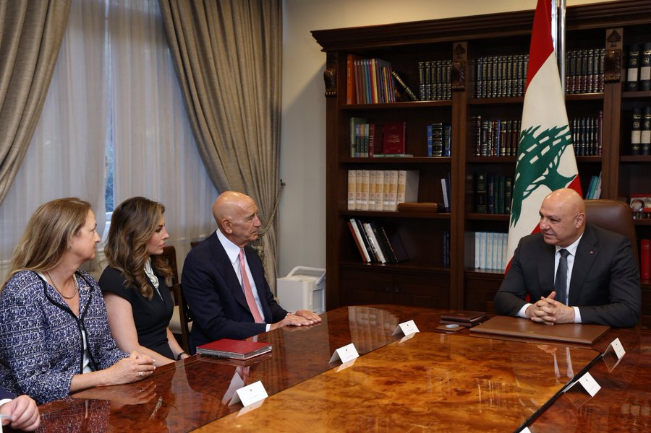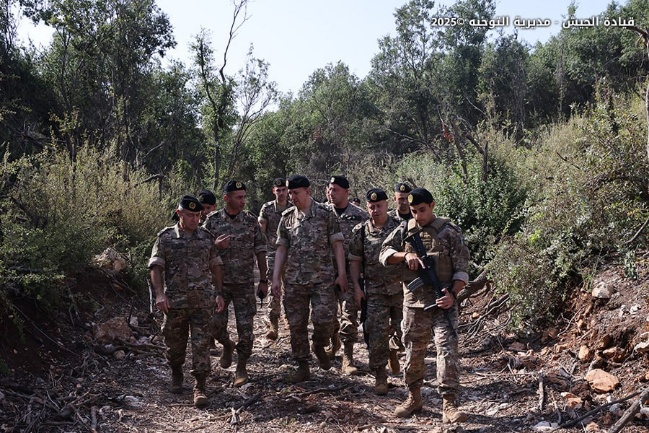 The commander of the Lebanese army visits the scene of the explosion (Lebanese army X account, August 15, 2025)
The commander of the Lebanese army visits the scene of the explosion (Lebanese army X account, August 15, 2025)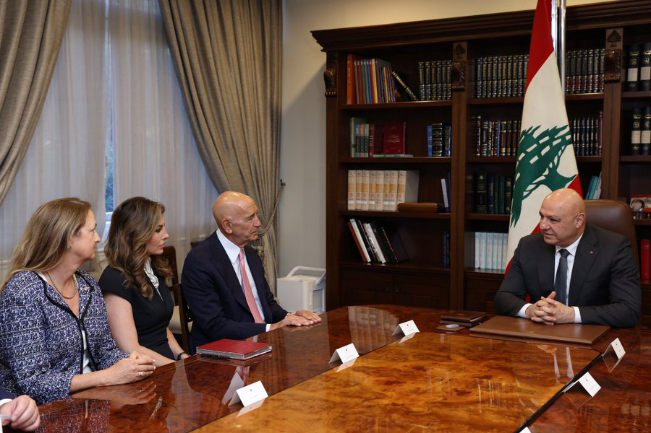 President Aoun meets with Barrack, Ortagus and the United States ambassador to Lebanon, Lisa Johnson (Lebanese president’s office X account, August 18, 2025)
President Aoun meets with Barrack, Ortagus and the United States ambassador to Lebanon, Lisa Johnson (Lebanese president’s office X account, August 18, 2025)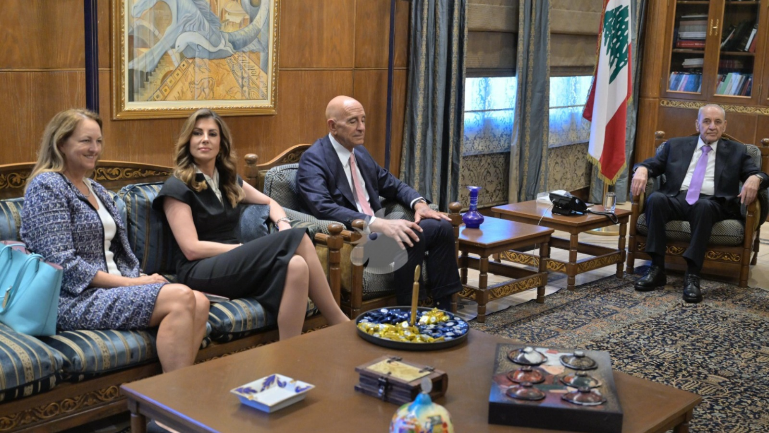 Berri meets with Barrack and Ortagus (al-Nahar, August 18, 2025)
Berri meets with Barrack and Ortagus (al-Nahar, August 18, 2025)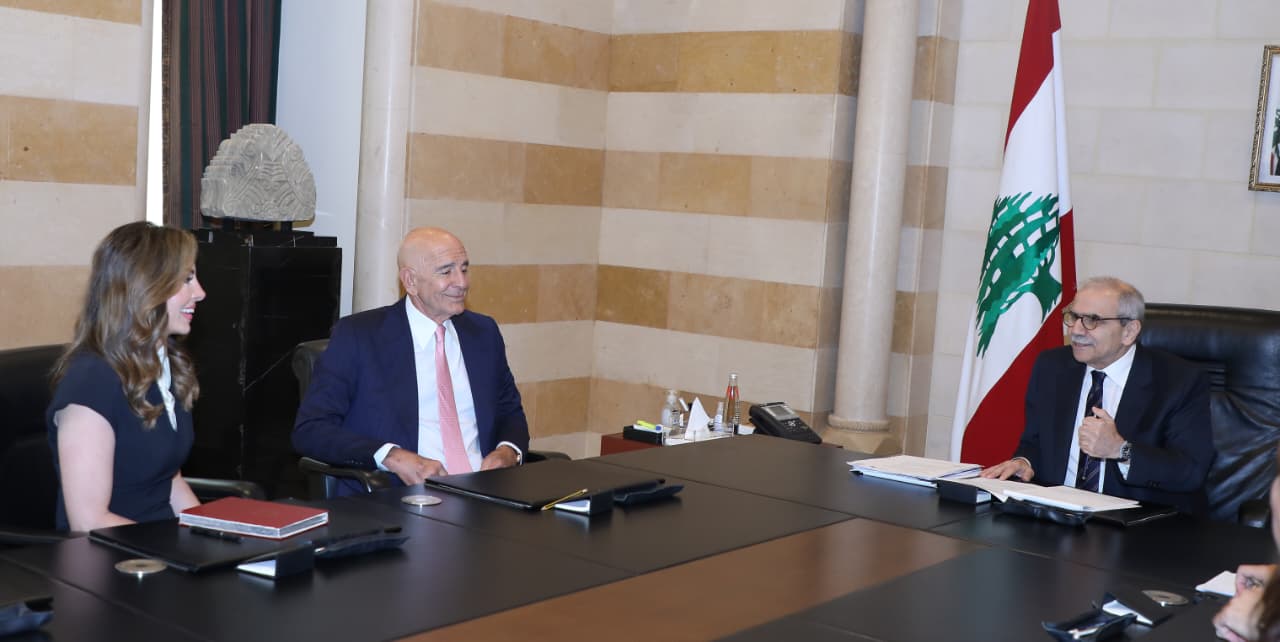 Salam meets with Barrack and Ortagus (Lebanese prime minister’s office X account, August 18, 2025)
Salam meets with Barrack and Ortagus (Lebanese prime minister’s office X account, August 18, 2025)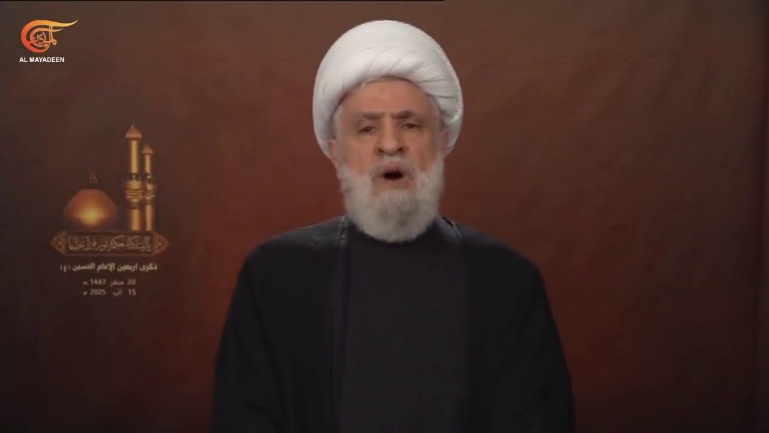 Na’im Qassem delivers his Arbaeen Day speech (al-Mayadeen, August 15, 2025)
Na’im Qassem delivers his Arbaeen Day speech (al-Mayadeen, August 15, 2025)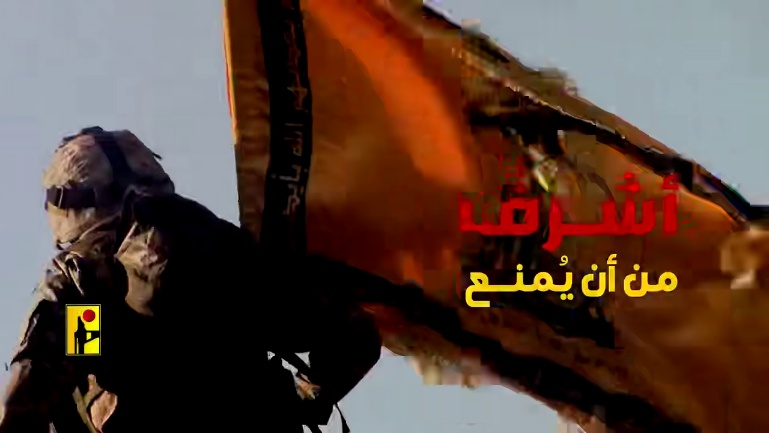 From Hezbollah’s propaganda video (Hezbollah combat information Telegram channel, August 12, 2025)
From Hezbollah’s propaganda video (Hezbollah combat information Telegram channel, August 12, 2025)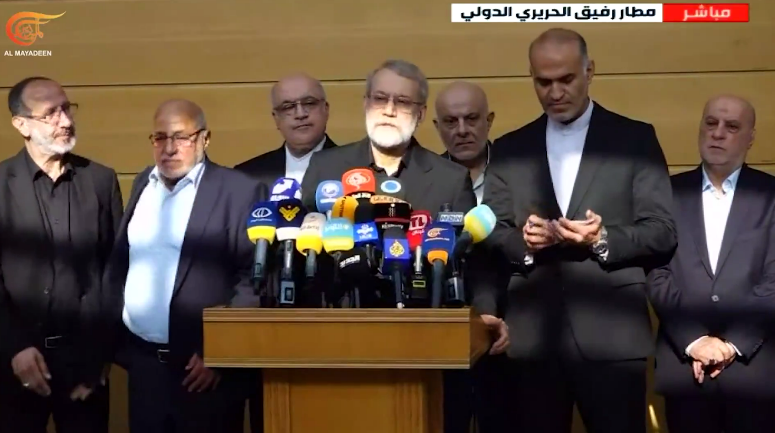 Larijani at the reception with Hezbollah representatives at the airport (al-Mayadeen, August 13, 2025)
Larijani at the reception with Hezbollah representatives at the airport (al-Mayadeen, August 13, 2025)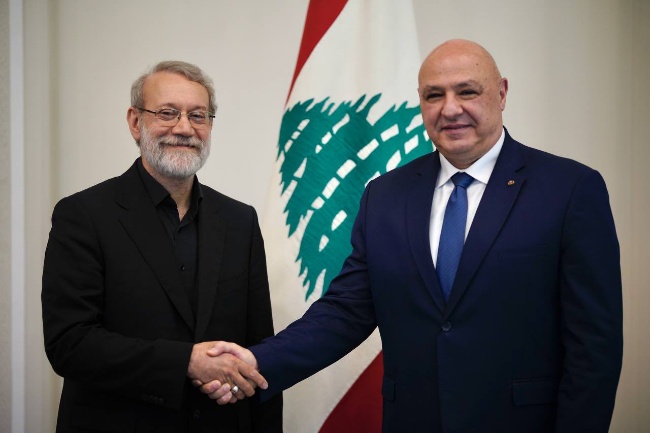 Aoun and Larijani (Lebanese president’s office X account, August 13, 2025)
Aoun and Larijani (Lebanese president’s office X account, August 13, 2025)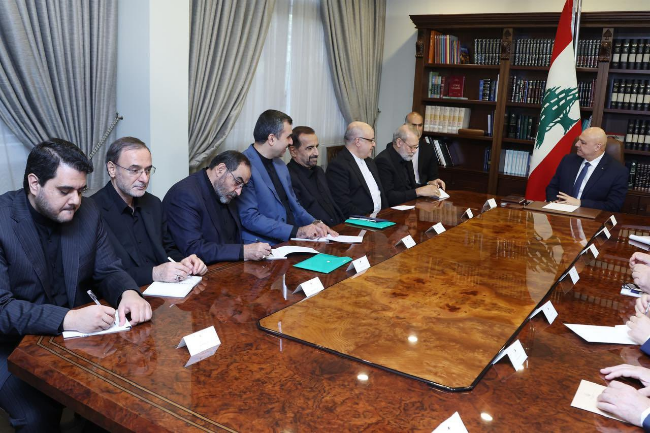 Aoun and Larijani (Lebanese president’s office X account, August 13, 2025)
Aoun and Larijani (Lebanese president’s office X account, August 13, 2025)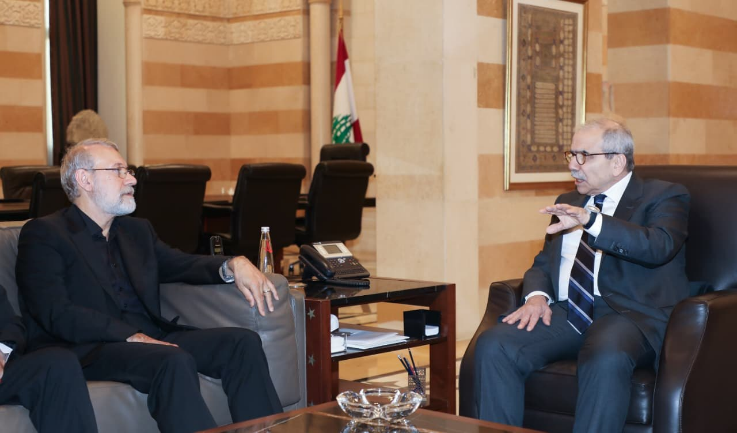 alam and Larijani (Right: al-Nashra, August 13, 2025; Left: Ali Larijani’s X account, August 13, 2025)
alam and Larijani (Right: al-Nashra, August 13, 2025; Left: Ali Larijani’s X account, August 13, 2025)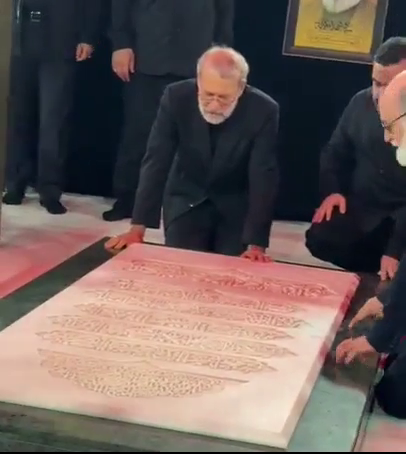 Larijani at the grave of former Hezbollah secretary general, Hassan Nasrallah (PRESS TV, August 13, 2025)
Larijani at the grave of former Hezbollah secretary general, Hassan Nasrallah (PRESS TV, August 13, 2025)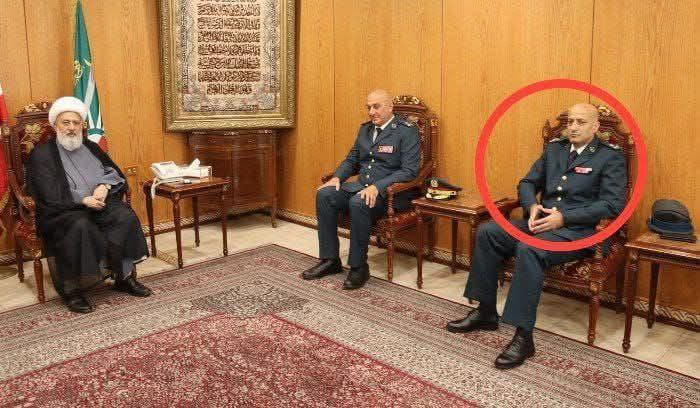 Maher Raad (circled) in an archive photo (Aram News, August 12, 2025)
Maher Raad (circled) in an archive photo (Aram News, August 12, 2025)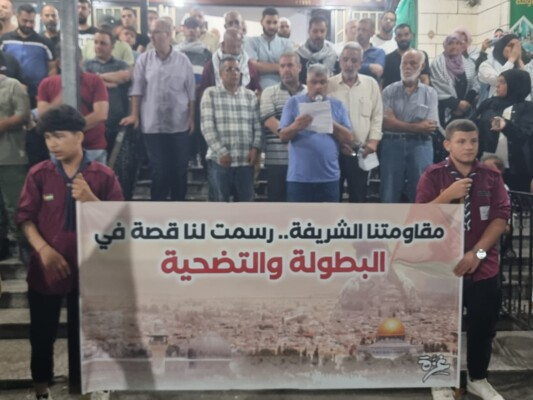 Hamas rally in the Ain al-Hilweh camp (al-Nashra, August 17, 2025)Overview[1]
Hamas rally in the Ain al-Hilweh camp (al-Nashra, August 17, 2025)Overview[1]
The IDF attacked Hezbollah facilities above and below ground and eliminated operatives as part of its ongoing activity against Hezbollah’s presence in south Lebanon which violates the ceasefire, and against the organization’s efforts to rebuild its military capabilities and restore its arsenal.
There were differences of opinion between the American administration and the European countries ahead of the discussion in the Security Council on extending the UNIFIL mandate in south Lebanon.
American special envoy Thomas Barrack arrived in Beirut for talks, the first time since the government’s decision to disarm Hezbollah. He said it was now Israel’s turn to implement its own measure. Hezbollah’s opponents reacted angrily to secretary general Na’im Qassem’s statement that Hezbollah would not give up its weapons as long as “Israeli aggression” continued, adding that the “resistance” would battle the decision and would not agree to surrender.
The secretary of Iran’s supreme national security council, Ali Larijani, visited Lebanon and met with the heads of state and with Hezbollah’s leadership. The president of Lebanon and the prime minister said they did not agree to Iranian intervention in the state’s internal affairs.
Mahmoud Abbas, chairman of the Palestinian Authority, instructed the new Palestinian ambassador in Lebanon to carry out the decisions regarding transferring Palestinian weapons and refugee camps to the authority of the Lebanese state.
The Ceasefire
The IDF
The IDF continued attacking Hezbollah targets in south Lebanon which were in violation of the ceasefire agreement of November 27, 2024, prohibiting the organization’s presence south of the Litani River, and taking action against Hezbollah’s attempts to rebuild its military capabilities and restore its arsenal. The IDF attacked Hezbollah facilities above and below ground, and a Hezbollah terrorist operative was eliminated in south Lebanon (IDF spokesperson, August 11-18, 2025). The Lebanese ministry of health reported one person killed and seven wounded in Israeli attacks (al-Nashra, August 11-18, 2025). Media outlets in Lebanon reported Israeli airstrikes in open areas in al-Jarmaq and Raghaz in south Lebanon and in the Hama Zalaya area in the western Beqa’a Valley, on the Beaufort, on the outskirts of the village of Tebnit and in al-Nabatiyeh al-Fawqa (al-Manar, August 14, 2025; al-Mayadeen, August 15, 2025).
Hezbollah
In a speech delivered by Hezbollah secretary general Na’im Qassem to mark Arbaeen Day,[2] he called on the Lebanese government to plan a confrontation against the [Israeli] “aggression,” since the government’s purpose was to promote stability and reconstruction and not to hand the country over to the “Israeli monster” and the “American tyrant.” Regarding the visit of IDF Chief of Staff Zamir in south Lebanon, he asked what those who claimed they were in favor of sovereignty and concentration of weapons were doing about it (Hezbollah combat information Telegram channel, August 15, 2025).
The Lebanese Army
Lebanese President Joseph Aoun met with Defense Minister Michel Manassa and Rodolf Haykal, commander of the Lebanese army, following the explosion in which six Lebanese army soldiers were killed while dismantling a Hezbollah weapons warehouse in south Lebanon on August 9, 2025. He also went to the hospital to visit one of the Lebanese army soldiers who had been injured in the explosion (Lebanese president’s office X account, August 12, 2025).
Later, Haykal toured the area of the explosion in Wadi Zibqin and reviewed the circumstances of the incident. He expressed his condolences for the death of the soldiers and reiterated that the army was committed to fulfilling its duties in the shadow of repeated attacks by the “Israeli enemy” (Lebanese army X account, August 15, 2025).

The commander of the Lebanese army visits the scene of the explosion
(Lebanese army X account, August 15, 2025)
UNIFIL
Reportedly, ahead of the discussion at the end of August 2025 regarding the renewal of UNIFIL’s mandate, diplomatic efforts were intensified by Lebanon, the United States and France regarding the future of the UN force, and regarding differences of opinion between the United States and the European countries. According to “a source close to the American State Department,” UNIFIL’s presence helped empower the Lebanese government, but in the assessment of the American administration, the force had failed to weaken Hezbollah’s military presence and therefore its mission should be ended and full security responsibility transferred to the Lebanese army. According to the report, the French proposal on renewing UNIFIL’s mandate submitted to the Security Council called on Israel to withdraw from five points in south Lebanon in the hope that transferring responsibility to the Lebanese army and UNIFIL would reduce the risk of confrontation with Hezbollah. However, “diplomats familiar with the details of the proposal” admitted that although it was intended to support Lebanon’s sovereignty and stability, it could strengthen Hezbollah’s presence on the ground if it was not accompanied by close supervision and a fundamental change in UNIFIL’s policy of action (Beirut International Correspondents, August 18, 2025). “Official sources” later reported that the American administration wanted to renew the mandate for one year, until the end of 2026, but wanted to reduce the force’s budget and the number of its personnel (al-Hadath, August 18, 2025).
Disarming Hezbollah[3]
The Lebanese Administration
On August 18, 2025, American envoy to Lebanon Thomas Barrack met with the leaders of the Lebanese leadership, for the first time since August 5 and 7, when the Lebanese government decided to disarm the armed militias, including Hezbollah, and to adopt the principles of Barrack’s document from July 2025. He was accompanied by deputy American envoy to the Middle East Morgan Ortagus, his predecessor. “Official sources” noted that while Barrack dealt with implementing the government’s decision on the monopoly of weapons and clarifying the timetables, Ortagus focused on the issue of UNIFIL and the extension of its mandate, which ends at the end of August 2025 (Beirut International Correspondents, August 18, 2025). Other “sources” reported that the Americans were going to convey a message to Rodolf Haykal, commander of the Lebanese army, to implement the government’s decision without hesitation. They added that the United States and Saudi Arabia would probably tell Lebanon that its demands for the cessation of “aggression” and Israeli withdrawal would be postponed until it committed to practical steps regarding disarming Hezbollah (al-Akhbar, August 18, 2025). According to “American sources,” Barrack and Ortagus’ visit to Lebanon was a direct response to the visit of Ali Larijani, secretary of Iran’s Supreme National Security Council, to make it clear that decisions in Lebanon were not made in Tehran (al-Jumhuriya, August 18, 2025).
Barrack and Ortagus met with President Joseph Aoun, and Barrack congratulated him on the government’s decisions. Aoun replied that currently necessary were the commitment of the other parties to the content of the joint declaration, further support for the Lebanese army and an international acceleration of the reconstruction of the areas attacked by Israel (Lebanese president’s office X account, August 18, 2025).

President Aoun meets with Barrack, Ortagus and the United States ambassador to Lebanon, Lisa Johnson (Lebanese president’s office X account, August 18, 2025)
After the meeting, Barrack said they had discussed Hezbollah’s disarmament, noting it served the Shi’ites since the results would be positive for all Lebanese. He said the United States was “hopeful” and he expected there would be significant progress in the coming weeks which would translate into better lives for Lebanon and the neighboring states. Barrack said now that Lebanon had made the first decision, Israel needed to take its own step and everyone needed to cooperate to prevent confrontations. Regarding Hezbollah, he said it needed to understand that limiting weapons to the state was the best option and it had to think what alternative was better. As to whether international aid would be suspended if Lebanon did not disarm the militias, Barrack said “there are no threats in play” (Spot Shot TV, August 18, 2025).
“Knowledgeable Lebanese sources” said Washington would participate in disarming Hezbollah along with the Lebanese army, a step described as a strategic change in the American administration’s policy towards Lebanon. “The sources” noted that officials in the Lebanese regime had been informed that in coordination with the Lebanese army, the United States would include American military experts in the disarmament process. According to “sources,” American participation had significant risks which could worsen the crisis in Lebanon and deepen the division between the Lebanese political forces (Aram News, August 14, 2025).
Interviewed ahead of Barrack’s visit, President Aoun said the paper Barrack presented included an Israeli withdrawal and the rehabilitation of the Lebanese economy. He said there had been no threats to Lebanon in the demand to implement the American proposal, and added that approval of the document allowed the world to apply pressure on Israel, while a Lebanese refusal would have led to increased attacks and the collapse of the state (al-Arabiya, August 17, 2025).
After meeting with Aoun, Barrack and Ortagus met with Nabih Berri, speaker of the Lebanese Parliament. He asked about Israel’s commitment to the ceasefire agreement and withdrawal from Lebanese territory, saying they were the key to stability in Lebanon, would provide an opportunity to begin the reconstruction process and ensure support for the Lebanese army. However, Barrack made no commitments, stating after the meeting that everyone was moving in the right direction and it was important to achieve prosperity and comprehensive peace for all the groups in the country (al-Nashra, August 18, 2025). Before the meeting, Berri said he had nothing to offer Barrack and would listen to his opinion on how Hezbollah should be disarmed. Berri, Hezbollah’s close ally, called for a dialogue on the decision to limit weapons and “not to go the current way,” and added that no decision on Hezbollah’s weapons could be implemented as long as Israel refused to meet its commitments, when according to him Hezbollah had not fired a single bullet since the ceasefire agreement, in contrast to Israel, which continued its attacks (al-Hadath, August 17, 2025).

Berri meets with Barrack and Ortagus (al-Nahar, August 18, 2025)
Barrack and Ortagus also met with Lebanese Prime Minister Nawaf Salam, who said government decisions were based on national interest. He added that the Americans a responsibility to apply pressure on Israel to stop its “aggression,” withdraw from five points in south Lebanon and release the Lebanese it was holding. He also noted the importance of support for the Lebanese army and of renewing UNIFIL’s mandate (al-Nashra, August 18, 2025).

Salam meets with Barrack and Ortagus
(Lebanese prime minister’s office X account, August 18, 2025)
In view of the crisis surrounding the government’s decisions on disarmament, Nabih Berri said it was out of the question for Hezbollah and Amal ministers to resign from the government. He said Lebanon was going through an exceptional period which required all groups in Lebanon to demonstrate responsibility and wisdom (al-Jumhuriya, August 12, 2025).
The Amal-affiliated minister of environmental quality, Tamara al-Zein, criticized the decision to convene a government meeting to discuss disarmament and argued that “an agreement should have first been reached between the sides.” She called the details of the Barrack document “frightening,” claiming each clause contained a “trap.” She said the government session, in which the Lebanese army would present its plan regarding exclusivity over weapons, would be held on September 2, 2025, adding that the army should discuss it with Aoun, Berri, and Salam. She added that until the last moment Berri would try to prevent Lebanon from and or tension (al-Jadeed, August 14, 2025).
Hezbollah
in his speech for Arbaeen Day, Hezbollah secretary general Na’im Qassem related to the government decision regarding Hezbollah’s disarmament. He claimed that most Lebanese supported the continuation of the “resistance”[4] and the government’s decision “stripped the “resistance” and Lebanon of defensive weapons while “aggression” continued. He claimed the government’s “very dangerous decision” exposed the state to crisis, and accused it of serving the “Israeli project” and working “to eliminate the resistance,” even at the price of civil war. Qassem said Hezbollah and Amal were postponing their followers’ taking to the streets in order to allow discussion and amendments, but the organization was prepared to hold marches that would reach as far as the American embassy. He warned that if the “resistance” were required to relinquish its weapons, it would be prepared to enter into “a Karbala campaign”[5] against the “Israeli-American plan,” whatever the price, and Hezbollah was confident it would emerge victorious from such a confrontation. He claimed the Lebanese government would be responsible for a civil war since Hezbollah did not want one. Qassem said, “Either we survive together or everything collapses, and you will bear the responsibility” (Hezbollah combat information Telegram channel, August 15, 2025).

Na’im Qassem delivers his Arbaeen Day speech (al-Mayadeen, August 15, 2025)
Ali Haidar, editor for Israeli affairs at Hezbollah’s daily al-Akhbar, said Qassem had declared Hezbollah’s position and shown a choice based on risks and alternatives. He said Qassem sought to redraw the boundaries of confrontation inside Lebanon and to define the ceiling of political warning on which the “resistance” would not compromise, adding that the positions Qassem presented were the consequence of the path chosen by the state, which was moving away from the idea of national defense and entering an extremely dangerous course which could lead to dismantling Lebanon from within. He claimed that would be an achievement Israel had not managed to accomplish throughout its entire history (al-Akhbar, August 18, 2025).
Qassem’s threats about the possibility of an internal Lebanese confrontation in the event of an attempt to disarm Hezbollah caused angry reactions from Hezbollah’s political opponents:
Lebanese prime minister Nawaf Salam said that Qassem’s statements contained “a veiled threat of civil war.” He said no one in Lebanon wanted a civil war and threats and intimidation were completely unacceptable. Salam noted that the Taif Agreement was their charter and it explicitly stipulated the extension of the state’s authority over all its territory. He said no side was permitted to bear arms other than the state and no one had asked to transfer Hezbollah’s weapons to “the Israeli enemy” but rather to the Lebanese army. He also defended the right of Hezbollah supporters to protest the government’s decision regarding the weapons monopoly but warned against “irresponsible actions that encourage conflicts” (al-Sharq al-Awsat, August 15–16, 2025).
Deputy prime minister Tareq Mitri said they had to avoid accusations of treason, intimidation and threats, adding that they wanted to preserve civil peace and no one wanted a confrontation with the Lebanese army. He noted that there was still room to reflect on how to implement and handle the exclusivity plan for weapons and added that there were internal and external difficulties and pressures, but the Lebanese had to choose wisely (al-Nashra, August 16, 2025).
Lebanese justice minister Adel Nassar, affiliated with the Christian Phalange party, said the threats of “certain elements” to destroy Lebanon to protect their weapons put an end to the claim that the weapons were meant to defend Lebanon (Adel Nassar’s X account, August 15, 2025).
Leader of the Christian Lebanese Forces party Samir Geagea said that Qassem’s remarks were absolutely unacceptable and constituted a first-class direct threat to the Lebanese government and every free Lebanese citizen. He added that if Qassem thought Lebanon was not the homeland of the “free Lebanese” he was mistaken, and if he thought he could instill fear in the hearts of the “free Lebanese” then he was “doubly mistaken.” Geagea called on all “free Lebanese” to stand united behind the state institutions, the president and the prime minister, who sought to restore Lebanon to the height of its glory. He stressed that “we stand on the threshold of a formative period in Lebanon, and we will not allow any party to thwart the attempt again” (Lebanese National News Agency, August 16, 2025).
Christian Phalange party member of the Lebanese Parliament Nadim al-Jamil said that Lebanon would not survive as long as Hezbollah’s weapons remained outside state authority. He said the government had to act decisively (al-Nashra, August 15, 2025).
Sunni member of the Lebanese Parliament Ashraf Rifi, a former justice minister, said that several bodies were preparing a legal case against Qassem (al-Arabiya, August 15, 2025). He said to Hezbollah, “There is only one solution: the state, the state, the state.” He warned against repeating the threat of civil war and emphasized that it would be a great disaster for everyone, especially Hezbollah. He called on Hezbollah to return to its homeland and the state and to end its submission to Iran, which he said “began to collapse because it was on a historical illusion that had long since passed” (al-Nashra, August 15, 2025).
Other Hezbollah figures continued the aggressive line presented by Na’im Qassem and said they had no intention whatsoever to give up the organization’s weapons, especially as long as the “Israeli aggression” continued:
Deputy chairman of Hezbollah’s political council Mahmoud Qamati confirmed Qassem had warned that the decision to hand over weapons would lead to confrontation, but claimed that his position was not new and Qassem had already discussed the need for a national defense strategy and “the fact that we will not hand over our weapons.” Qamati added that “we cannot hand over the weapons during the occupation.” He called for national unity because “Lebanon’s existence and sovereignty are threatened” (al-Jazeera, August 15, 2025).
Hezbollah member of the Lebanese Parliament Ibrahim al-Moussawi said “the weapons of the resistance are not up for negotiation” and claimed they were the “real guarantee” for defending Lebanon against the “ongoing Israeli aggression.” According to him, the demand for disarmament came without any guarantees against “Israeli ambitions,” and therefore Hezbollah, Amal and the entire “resistance” movement[6] had to stand firm. He said no one was more concerned about civil war in Lebanon than Hezbollah, claiming that even among those calling for disarmament of the “resistance” were people who said there was no guarantee except for the weapons, especially in light of Israel’s [alleged] “ambitions and plans.” He said, “Our weapons are our guarantee, and the army is the protector of all when it is properly armed and given the decision to defend” (al-Nashra, August 16, 2025).
Hezbollah member of the Lebanese Parliament Ali Fayyad called the current situation in Lebanon “critical, dangerous, and complex” because of “American-Israeli aggression,” along with other elements exerting pressure on Lebanon. He accused the state leadership of worsening the situation by adopting policies and making decisions regarding the weapons monopoly and expanding sovereignty, thereby attacking the “resistance” and its weapons in a way that served “the American and Israeli goal.” He claimed the Lebanese government had “made a serious mistake and placed the country in danger by retreating from a position of prioritizing Israeli withdrawal and the cessation of ‘aggression.’” He claimed Hezbollah was committed to a “flexible, positive approach” and allowed the Lebanese authorities to handle the situation, but they chose “to yield to external dictates and Israeli conditions” (al-‘Ahed, August 17, 2025).
Hezbollah released a new propaganda video called, “My weapon is too sacred to be relinquished.” According to the video, “The weapon is too honorable to be denied;” “It is my weapon, the symbol of my struggle, and it will always be present on the battlefield;” and “The weapon protects my country and will defeat aggression” (Hezbollah combat information Telegram channel, August 12, 2025).

From Hezbollah’s propaganda video
(Hezbollah combat information Telegram channel, August 12, 2025)
The Sunni al-Jama’a al-Islamiyya, one of Hezbollah’s close allies, said it respected the right of the Lebanese state to a monopoly on weapons but it was inconsistent with the “Israeli occupation” and ongoing attacks, and therefore the movement preferred to consider a defensive strategy rather than hand over its weapons. The movement stated that the state bore full responsibility for defending the nation and its sovereignty and called on President Aoun to initiate a national dialogue on a security strategy to defend the state (al-Jama’a al-Islamiyya Telegram channel, August 12, 2025).
Secretary of Iran’s Supreme National Security Council Visits Lebanon
Ali Larijani, secretary of Iran’s Supreme National Security Council, arrived in Lebanon for a visit for the first time since he was appointed to the position on August 5, 2025, because of the government’s decision to disarm Hezbollah. Upon arrival he was received by Hezbollah members of parliament, while Hezbollah supporters waited for him near the airport waving Hezbollah and Iranian flags (al-Manar, August 13, 2025).

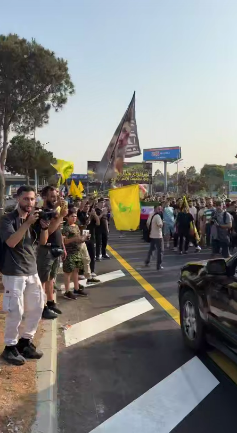
Right: Hezbollah supporters near Beirut airport greet Larijani’s arrival (al-Alam TV, August 13, 2025). Left: Larijani at the reception with Hezbollah representatives at the airport (al-Mayadeen, August 13, 2025)
While in Lebanon Larijani met with the Lebanese president, prime minister and other government leaders who told him about their determination to ensure the state’s monopoly on weapons and their discontent with statements made by Iranian officials on the issue, which was sensitive. Larijani also met with the leader of Hezbollah and reiterated his country’s support for the organization:
Lebanon’s president, Joseph Aoun, told Larijani that he rejected the idea of a friendship between the two states based on a single element, Hezbollah, and he opposed the statements made by Iranian officials who had expressed their objection to Hezbollah’s disarmament. Aoun said the Lebanese people were represented by the state institutions and he opposed interference in Lebanon’s internal affairs by any external party in order to maintain a safe and stable arena for all Lebanese. Aoun also said only the Lebanese army was allowed to possess weapons and to acquire arms from abroad. He said, “We do not interfere in the affairs of other states and respect their privacy, including Iran.” He added, “Everyone paid a heavy price for seeking foreign support against other Lebanese, and therefore the lesson that the Lebanese can draw is that no party is entitled to bear arms and seek foreign support.” Larijani claimed Iran wanted to strengthen its relations with Lebanon and added that states outside Lebanon should not give orders to Lebanon and dictate what it should do. He claimed Iran would respect any decision taken by the Lebanese government in cooperation and coordination with the “armed factions” in Lebanon, but stressed that the Lebanese had to understand that “the resistance” was an asset [sic] and they should preserve it (al-Nashra, August 13, 2025). In a television interview, Aoun said any foreign interference in Lebanon’s internal affairs was unacceptable and he had told Iran not to interfere in Lebanon’s affairs. He added that limiting Hezbollah’s weapons was a Lebanese decision unrelated to Iran (al- Arabiya, August 17, 2025).


Aoun and Larijani (Lebanese president’s office X account, August 13, 2025)
Lebanese Prime Minister Nawaf Salam told Larijani that the recent statements by some Iranian officials, which included direct criticism of decisions taken by the authorities in Lebanon, were unacceptable and constituted a blatant deviation from diplomatic practice. He said the statements violated the principle of mutual respect for sovereignty and neither he nor any other Lebanese official presumed to interfere in Iran’s internal affairs. He added that any connection between an external actor and Lebanon had to pass through the constitutional institutions and not through any political party or parallel channel. He said Lebanon had paid the highest prices in the confrontation with Israel and did not need lessons from anyone. Salam noted that Lebanon wished to maintain its historic ties with Iran, but the unity of the Lebanese, their sovereign state and the decisions of their government were red lines which could not be crossed (al-Nashra, August 13, 2025). Interviewed by the press, he said Lebanese decisions were made in Beirut and were not dictated by Tehran or Washington, adding that the days when Iran claimed control over four Arab capitals were over (al-Sharq al-Awsat, August 16, 2025).
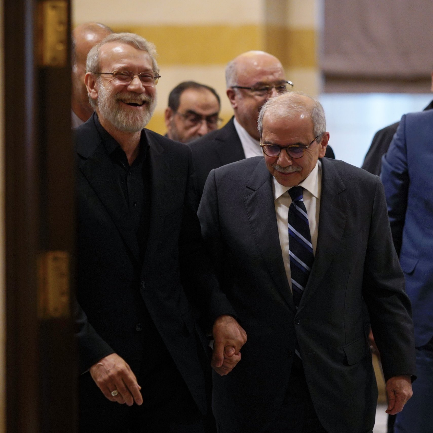

Salam and Larijani
(Right: al-Nashra, August 13, 2025; Left: Ali Larijani’s X account, August 13, 2025)
During Larijani’s visit to Lebanon, Nabih Berri, speaker of the Lebanese Parliament, said in an interview that Lebanon had to wait and prepare for the front with Israel because its “plans were directed against all of Lebanon.” He added, “Iran is and will remain a friend of Lebanon.” Berri said the story of Hezbollah had not ended and Hezbollah remained one of the largest political parties in Lebanon despite everything it had gone through (al-Nahar, August 13, 2025).
Hezbollah secretary general Na’im Qassem met with Larijani and thanked Iran for its continued support for Lebanon and Hezbollah, and for its steadfast position with Lebanon’s unity, sovereignty, and independence. He added that the relations between the Iranian and Lebanese were “stable: (al-Manar, August 14, 2025). In his speech for Arbaeen Day, Qassem again expressed gratitude to Iran for its support of “the resistance” with money, weapons, capabilities and media and political positions. He also praised the Iranian leadership, the government and the Revolutionary Guards (Hezbollah combat information Telegram channel, August 15, 2025).
Interviewed by the Lebanese media, Larijani said that in Iran they believed the sovereignty of states should be respected and states should not surrender to other states. He claimed that “the resistance”[7] was an important asset for regional states and every state made decisions based on its regime and Iran did not interfere. He claimed Hezbollah and Hamas had reached sufficient maturity and an examination of history would show that Iran did not dictate to them what to do, but that they made their own decisions (al-Mayadeen, August 14, 2025).

Larijani at the grave of former Hezbollah secretary general, Hassan Nasrallah
(PRESS TV, August 13, 2025)
Hezbollah’s opponents did not hide their discontent with the visit, with affiliated media outlets declaring that he was “persona non grata” and emphasizing the opposition of Aoun and Salam to Iranian interference in Lebanon’s internal affairs (Nidaa al-Watan, August 13-14, 2025). Lebanese foreign minister Yousef Rajji, affiliated with the Christian Lebanese Forces party, boycotted Larijani’s visit, claiming they had not met because of “time constraints.” However, Rajji added that “even if I had had time, I would not have met him” (MTV Lebanon, August 13, 2025).

Right: Front page of the opposition daily Nidaa al-Watan, calling Larijani “persona non grata” (Nidaa al-Watan, August 13, 2025). Center: The headline reads, “A slap in the face from Aoun and Salam to Larijani” (Nidaa al-Watan, August 14, 2025). Left: The Arabic reads, “Aren’t we tired of the struggles between the camps?!” and, “Lebanon told Larijani: we are no longer part of the axis” (al-Liwaa, August 13, 2025)
The Lebanese Army
The head of Lebanese Army Intelligence in the Dahiyeh al-Janoubia, Maher Raad, related to Mohammad Raad, head of the Hezbollah faction in the Lebanese Parliament, relinquished his position unexpectedly and under unclear circumstances. According to some reports, he was dismissed after the United States Congress informed the Lebanese government that sanctions had been imposed because of his activities on behalf of Hezbollah operatives (al-Hadath, August 12, 2025). According to another report, he was removed from his position due to involvement in a criminal investigation dealing with drug and weapons smuggling (Aram News, August 12, 2025). Hezbollah affiliated journalist Jamal Shaib, claimed that contrary to reports from accounts affiliated with Hezbollah’s opponents, Raad had been transferred to another position in the office of the defense ministry comptroller (Jamal Shaib’s X account, August 12, 2025). Another report claimed that Gulf elements had led a disinformation campaign, spreading rumors about a “purge operation” of Shi’ites from the military establishment, including Maher Raad. However, “sources” reported that even before the escalation in the campaign against Israel in September 2024, Hezbollah and Amal had been aware of the decision to transfer Raad from his position, and that the appointment of Brigadier General Samer Hamada in his place was made in coordination with “the Shi’ite duo” [Hezbollah and Amal] (Beirut Review, August 12, 2025). A spokesperson for the Lebanese army said in response that the decision to replace Raad was part of routine processes that occurred from time to time. He called on the media not to publish military documents or inaccurate information about the army, as it had a negative effect (NNA, August 12, 2025).

Maher Raad (circled) in an archive photo (Aram News, August 12, 2025)
Reconstructing Lebanon
Activists and residents of Lebanese towns bordering Israel announced the establishment of the Association of Residents of the Southern Border Towns, whose objective was to ensure the safe return of residents and begin repairing the destruction caused by the Israeli attacks, with the slogan “Return, Security, Reconstruction.” Tareq Mazraani, one of the association’s founders, said their demands included ensuring the return of residents, reconstruction and compensation payments, and focusing on the daily concerns of the displaced, such as the cost of rent and living expenses for the returnees. He called on all political bodies to assist in extricating people from the current difficult situation in south Lebanon. Although the organizers of the association claimed it was not political, it was noted that the rally in Nabatieh indicated it might be supported by Hezbollah and Amal. The establishment of the association was reportedly perceived as a civilian mechanism to exert pressure on the Lebanese government, especially if its actions went beyond calls for sit-ins in public spaces (al-Sharq al-Awsat, August 16, 2025).
The Palestinians in Lebanon
“Sources closely following the Palestinian issue” revealed that the new Palestinian ambassador to Lebanon, Mohammad al-Assaad, who was born in Beirut and was familiar with Lebanon’s affairs, had received instructions from Palestinian Authority chairman Mahmoud Abbas requiring the transfer of Palestinian weapons and the transfer of the Palestinian refugee camps to the authority of the Lebanese state. In addition, after the decision of the Lebanese government, all armed Palestinian forces were required to hand over their weapons to the Lebanese army before the end of the year, the deadline set for implementing the state’s monopoly on weapons throughout Lebanon (al-Markazia, August 12, 2025).
“Sources” reported that the issue of Palestinian weapons had gained momentum before the arrival of the new Palestinian ambassador. Several Palestinian figures had gone to the prime minister’s office in Beirut to discuss the situation of the Palestinian refugees in the camps in Lebanon and the mechanisms for implementing the provisions of the joint declaration published by Mahmoud Abbas and President Aoun on May 20, 2025, regarding issues related to the situation of the Palestinian camps in Lebanon and the fact that the camps would remain under Lebanese law. It was further noted that the strengthening of the coordination between the Lebanese and Palestinian authorities was discussed to ensure stability in the camps and their surroundings (MTV Lebanon, August 12, 2025).
The commander of Palestinian National Security, al-Abed Ibrahim Khalil, arrived in Lebanon to examine the implementation of Mahmoud Abbas’ decisions regarding the regulation of weapons in the refugee camps (Aman24 Facebook page, August 14, 2025). Khalil toured the Bourj al-Barajneh refugee camp, accompanied by the commander of Palestinian National Security in the Beirut area, Omar Ghadban. He visited the security posts in the refugee camp and examined the level of operational readiness. He also met with representatives of local institutions and popular committees and noted the importance of cooperation between the security forces and the local community, and praised the residents’ resilience and their cooperation in dealing with challenges (Ouda TV Facebook page, August 15, 2025). He also toured the al-Jalil camp in the Beqa’a Valley with the Palestinian National Security commander in the area, Khaled Tsacher, and Fatah’s secretary general in the Beqa’a Valley, Firas al-Hajj. Khalil was briefed on preparedness in the field and met local representatives (Falestinona, August 16, 2025).
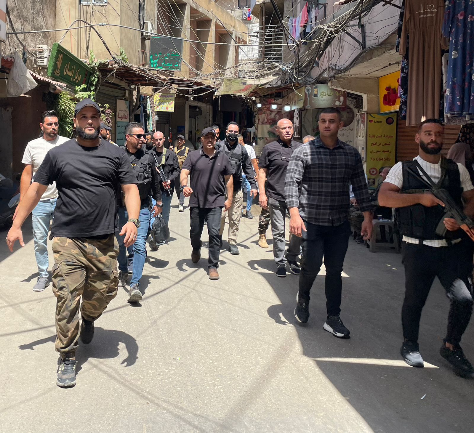
Khalil in the Bourj al-Barajneh camp (Ouda TV Facebook page, August 15, 2025)
The Hamas movement held a support rally for the Gaza Strip in the Ain al-Hilweh refugee camp, attended by representatives of the “Palestinian factions and Islamic forces.”[8] The Hamas representative in the camp, Husam Zaiter, gave a speech noting the unity of the Palestinian and Arab arenas vis-à-vis Israel and said “the path of resistance” remained the only possibility. He added that the Gaza Strip’s steadfastness was an integral part of the position of the Palestinian refugee camps in Lebanon, which were an inseparable part of the “struggle for liberation and return”[9] (al-Nashra, August 17, 2025).

Hamas rally in the Ain al-Hilweh camp (al-Nashra, August 17, 2025)
[1] Click https://www.terrorism-info.org.il/en to subscribe and receive the ITIC’s daily updates as well as its other publications.
[2] Arbaeen is a Shi’ite day of mourning marking forty days since the death of Imam Hussein bin Ali and others of the family of Ali bin Abu Taleb in the Battle of Karbala in the year 680 CE. On this day it is customary to make a pilgrimage to the grave of Imam Hussein in Karbala, Iraq.
[3] For further information, see the August 2025 ITIC report, Lebanese Government Decides to Disarm Hezbollah – Positions of Power Actors
[4} Anti-Israel terrorism and violence.
[5] Karbala is a city in central Iraq, known for its religious significance, particularly to Shi’ite Muslims. It was the location of the Battle of Karbala in 680 CE, where Imam Hussein (grandson of the Prophet Muhammad) was martyred. The event is central to Shi’a Islam, symbolizing sacrifice, justice and faith.
[6] Hezbollah, Amal and the Palestinian terrorist organizations operating in Lebanon.
[7] Iran, Hezbollah, the Palestinian terrorist organizations, the Houthis in Yemen and the Shi’ite militias in Iraq.
[8] Terrorist organizations.
[9] i.e., the destruction of the State of Israel.
Related Articles

